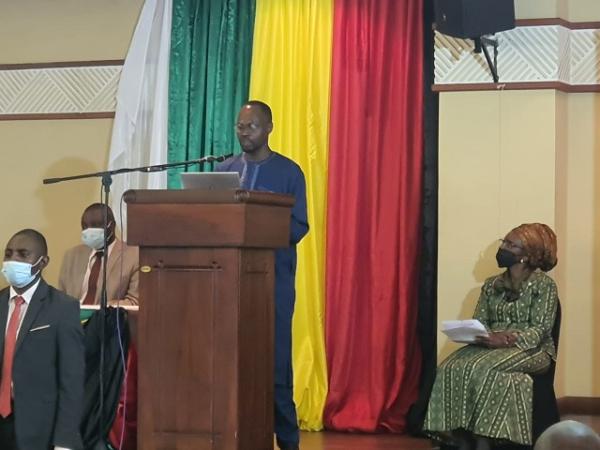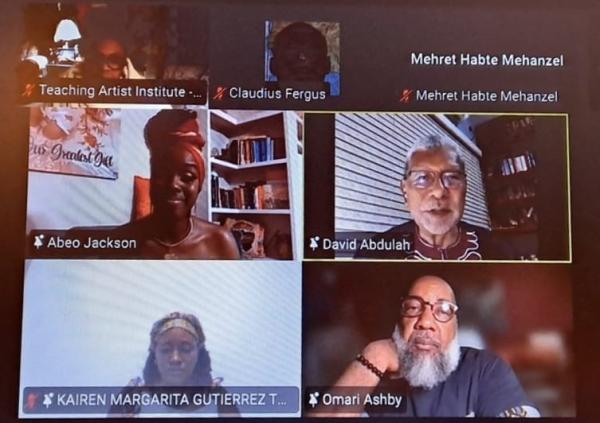
In line with the primary mandate of the African Academy of Languages (ACALAN) , as the specialised Language Agency of the African Union to provide technical support to Member States of the African Union for the development and implementation of vigorous and articulated language policies and strategies of language development and use as a factor of African integration and development, the Executive Secretary of ACALAN was invited by the Zimbabwean Ministry of Youth, Sport, Arts and
Recreation to participate in the 3-day National Languages Policy Conference of the government, in Victoria Falls, the Republic of Zimbabwe.
The conference took place from the 14th to 16th of June 2022, and was dubbed: “Redefining the Role of Zimbabwean Languages for National Development Towards Vision 2030 and Beyond.”
Commending the great initiatives of the Zimbabwean government to develop and promote African culture and languages, the Executive Secretary of ACALAN, in his remarks at the conference, excitedly expressed his joy and gratefulness to the government and the good people of Zimbabwe for the timely and comprehensive effort to develop and implement a national language policy to sustain Zimbabwean national languages. He described the conference as a milestone in the march toward the empowerment and promotion of African Languages as an effective factor of African integration and development.
The Executive Secretary reminded the participants that the Language Plan of Action for Africa was developed right back in 1984 by the Organisation of African Unity’s Inter-African Bureau of Languages (OAU-IBL), reviewed in December 2005 in Nairobi, Kenya, and subsequently adopted by the Sixth Ordinary Session of the Assembly of the Heads of State and Government of the Member States of the African Union, in Khartoum, Sudan, in 2006, at the same time with Statutes of the African Academy of Languages (ACALAN), the revised Charter for the African Cultural Renaissance, 2006 as the Year of African Languages as part of the Khartoum Decisions.
He outlined that the objectives of the Language Plan of Action for Africa is to encourage each and every Member State to develop and implement a clearly defined language policy; ensure that all languages within the boundaries of Member States are recognised and accepted as a source of mutual enrichment; liberate the African peoples from undue reliance on the utilisation of non-African languages as the dominant, official languages of the states; ensure that African languages, by appropriate legal provision and practical promotion, assume their rightful role as the means of official communication in the public affairs of each Member State, in partnership with former colonial languages, which have hitherto played this role; encourage the increased use of African languages as vehicles of instruction at all educational levels; ensure that all the sectors of the political and socio-economic systems of each Member State is mobilised in such a manner that they play their due part in ensuring that the African language(s) prescribed as official language(s) assume their intended role; and, foster and promote national, regional and continental linguistic unity in Africa, in the context of the multilingualism prevailing in most African countries.
He informed the participants that ACALAN organised the inaugural edition of the African Languages Week in January 2022 under the theme “African Languages: Levers for the Africa We Want,” in which many member states participated. The launch of the African Languages Week was, in line with its adoption by the Third Specialised Technical Committee on Youth, Culture and Sport of the African Union (STC-YCS3), in October 2018 in Algiers, Algeria, and subsequently by the Summit in 2019 based on a proposal of the Executive Secretariat of the African Academy of Languages. The African Languages Week, he said, is a perpetual rendezvous and major annual event to be held from 24 to 30 January that should be observed by all member states of the African Union, to commemorate the relevance of African languages and cultures in Africa and the African Diaspora, as a special moment of the African identity. He qualified as a pathway of realising Agenda 2063 of the African Union, specifically Aspiration 5 which promotes “An Africa with a strong cultural identity, common heritage, shared values and ethics.” He said that the African Languages Week aims also to increase awareness and appreciation of African languages by looking at more pragmatic ways of empowering and rendering them relevant to the lives of Africans. It is to promote the dynamics of African worldviews and philosophies of life, through the empowerment and use of African languages, and to demonstrate the indispensable role of African languages in promoting cooperation, integration and fostering cohesion and sustainable peace and development of Africa.
He informed the gathering that the Heads of State and Government of the Member States of the African Union during the 35th Ordinary Session in February 2022, adopted the Dar es Salam Framework for Action that ACALAN had developed as a collective commitment to action to ensure that Article 25 of the Constitutive Act of the AU (Previously Article 29 of the OAU Charter) is implemented by promoting Kiswahili as a working language of the African Union and a language of wider communication in Africa.
Dr Dampha told the participants that the most challenging part of African language development work to surmount is to have attitude change vis-à-vis the statuses and capabilities of African languages and cultures especially the attitudes of we, Africans, ourselves. Language matters, he said, have not been the development discourse of most African decision-makers, of most countries, which reflects the lack of essential support for African languages and cultures at the policy-making level, because most policy-makers put culture and languages at the periphery of their development programmes.
“Yet the role of language in the socio-economic development of a nation cannot be overemphasized”, he said. Language is essential to the identity of a people. It is a factor of sustainable development and builds a harmonious relationship in local and global contexts. Language is the principal means of communication and interaction for humans in a manner that enables the sharing of common ideas. In fact, the acquisition of language skills is one of the primary means of advancement that enabled humans to flourish. The primary purpose of language is effective communication, which in turn, is an important prerequisite and ensures development if it relates to the intended meaning as a vehicle to achieve the set of goals and not an end in itself. It is therefore a means to education, and promotes the identity of citizens of the nation and hence national unity, and sustainable socio-economic development in a larger perspective.
Therefore, rather than seeing African languages and cultures as burden and hindrance to the political processes, the economy, social cohesion and nation-building, and rather than limiting African languages to mere communication at the local level they should be an integral part of the factors of national development and Africa’s integration and this is what Zimbabwe has started to realise.
He concluded by saying that language empowerment is a long process, and language policy development and implementation is a longer process but a necessity to include the people of the nation in their own development. In the process, we as Africans should embrace Agenda 2063 of the African Union.
The Secretary for Youth, Sport, Arts and Recreation Dr T. Chitepo, presented an overview of the National Languages Conference on government and national languages towards the formulation of a Languages Bill.
Hon Prof. A. Murwira, Minister of Higher and Tertiary Education, Science and Technology Development also made remarks reiterating the importance of language policy in placing national languages at the fore in national development.
The Vice President and Minister of Health and Child Care, Hon. Dr C. G. D. N. Chiwenga pointed out in his remarks that the languages of the people have an indispensable role in the development of the people, and that is why Zimbabwean languages have an indispensable role to play in the development, social cohesion, peace and stability of the country.
In his Keynote Address and officially opening of the National Languages Conference, the President of the Republic of Zimbabwe, His Excellency Dr E. D. Mnangagwa urged the people of Zimbabwe to value the use of the country’s indigenous languages in the fight against corruption and promoting unity, peace and exercising nonviolent behaviour, as the country approaches the 2023 Harmonised General Elections. The President considered that the languages of the people are a resource that should be harnessed, not only to ensure cultural diversity, and intercultural dialogue but to also facilitate social transformation, human capital development and wealth creation. He also called upon parents and guardians to set a good example by teaching children indigenous languages, because that would help enforce cultural norms which emphasise respect for each other’s community and environment. President Mnangagwa said that his government is committed to keeping languages alive; that the Second Republic is implementing development that leaves no one and no place behind, and equally committed to keeping Zimbabwean languages alive by leaving no language behind. Before declaring the indaba open, he highlighted the indigenous languages are critical for improving social cohesion as they give communities a sense of inclusivity while nurturing national cultural identities, pride and the dignity of the people.






















